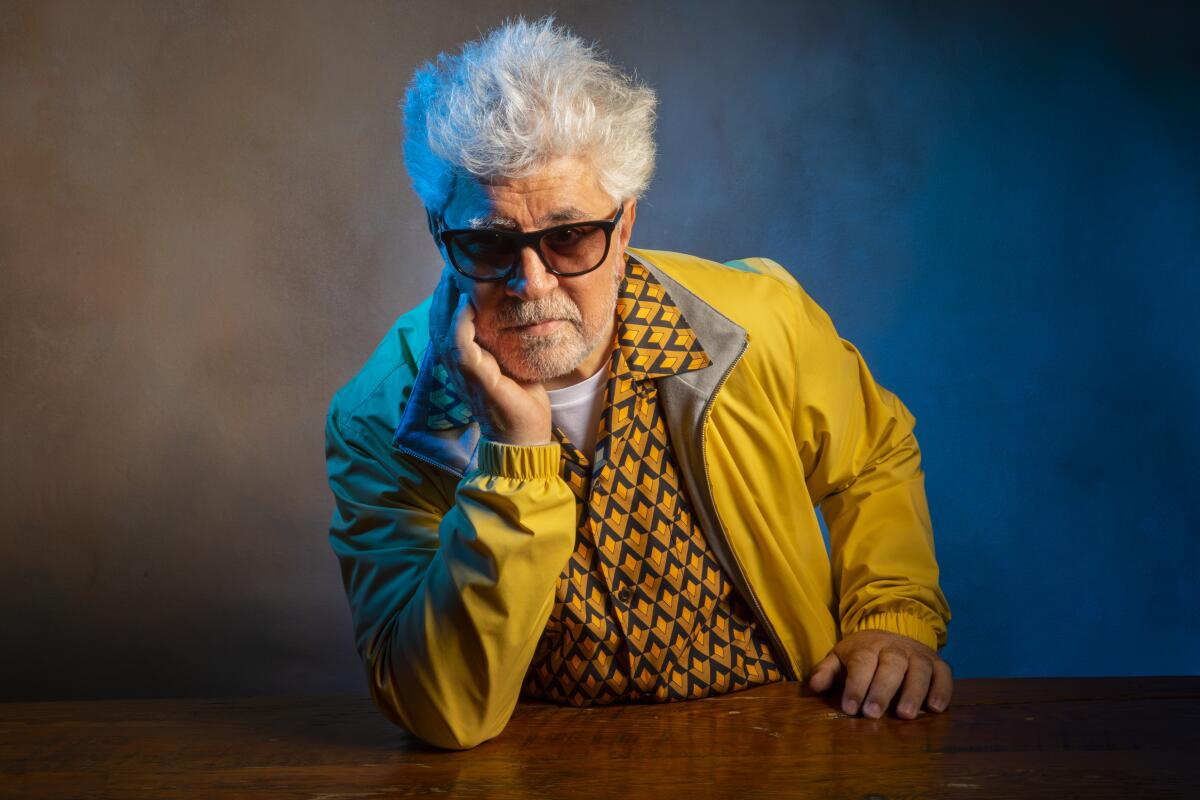Pedro Almodóvar wants you to know his ‘Pain and Glory’ is not strictly biographical

- Share via
Pedro Almodóvar is ready to put one slightly out-of-hand rumor to rest right now: “Pain and Glory” will not be his last cinematic effort. Somehow, that was the hot take following the melodrama’s release in Spain and its international debut to rapturous reviews at the 2019 Cannes Film Festival. In fact, while “Pain and Glory” does center on a fictional filmmaker who bears a more-than-passing resemblance to Almodóvar, the emphasis should be on “resemblance.”
Granted, history does tell us that Almodóvar had back surgery before filming his last picture, 2016’s “Julietta,” but the fact that the filmmaker at the heart of “Pain and Glory,” Salvador Mallo (played by Antonio Banderas), suffers from a number of debilitating ailments that have brought his career and personal life to an almost complete stop led to ridiculous speculation. In the real world, Almodóvar is feeling much better and already has the first draft of his next film completed.
“What I have found is that because people think that I’m as sick as the character in the film, they approach me with a lot of delicacy and a lot of tenderness to ask me how I am,” Almodóvar says through an interpreter. “I’ve never quite received a display of love that I have in this film and I’m quite grateful for it, but it’s really something that is provoked in them by Antonio’s character.”
What the 69-year-old filmmaker does admit, however, is that the fear the audience sees in Banderas’ character about not being able to direct again is something he lived through at the time. Especially “right after the operation where I thought I might not ever be able to shoot a film again.”
“Pain and Glory” finds the 60-something Mallo in a rut due to both his health and the somewhat recent death of his mother (Julieta Serrano). When he’s asked to speak at the 30th-anniversary screening of his breakthrough film, “Sabor,” he reunites with the movie’s lead actor, Alberto (Asier Etxeandia), to whom he hasn’t spoken since the premiere all those decades ago.
The actor offers him heroin as a pain reliever, and when he starts “chasing the dragon” he dreams of his life as a young boy in the village of Paterna, Spain, where he sparred with his young mother (Penelope Cruz) about his future and experienced a sexual awakening in the vision of a laborer (César Vicente) he taught to read and write. Almodóvar, who grew up in the small town of Ciudad Real before being sent to a religious boarding school, admits there are elements of his life in “Pain” but clarifies that he projects himself in all his movies.
“You know, my biography is in the rest of the 20 movies that I have done in the past,” Almodóvar says. “I don’t mind if these people think this is my life and this is a self-portrait, but it’s a movie. You always develop, mix fiction and reality. And also, when I say that I am very present in the movie, it’s not only me. [It’s] the memories of my brothers, my sisters and my friends, so everything that happens in the movie, it is indeed very familiar to me.”
This is the seventh collaboration between Almodóvar and Banderas, but as spot-on a casting choice as it seems at first glance, the Oscar winner insists he didn’t have anyone particular in mind while writing the script. It turns out Cruz was the first actor he thought of for a role. When it was time to make a decision over the film’s lead, he recalls, “Just for my mental health, I put three names under the character of Salvador. The first name was his. Fortunately, he was enthusiastic with the script and he absolutely loved the role.”
Banderas starred in four of the director’s films from 1986 to 1990. Considering so much of “Pain and Glory” takes place in that era, Almodóvar recognized the reunion just made too much sense.
“I mean, I met him in 1980. I remember that I treated him like my younger brother,” Almodóvar says. “We hung out every night in Madrid. It was the moment for that. And he knew very well the feelings of being in Madrid in that decade because the three male characters in the movie belong to that specific culture of the ’80s. And as a good friend of mine, he knew when some of them are based in my spirits.”
Almodóvar won his Academy Award in 2004 for “Talk to Her,” four years after “All About My Mother” took home the foreign-language film award. Despite the fact he’s had two submissions since, 2006’s “Volver” and “Julietta,” “Talk to Her’s” snub by the Spanish selection committee in 2003 for its foreign-language film entry stings.
“I was actually quite unhappy when they did not do that for ‘Talk to Her,’” Almodóvar admits. “I know it can seem like a lot of films, but I have also been working for 40 years, and I’m quite delighted about the fact that the Spanish Academy has selected ‘Pain and Glory’ to be the representative this year.”
More to Read
Only good movies
Get the Indie Focus newsletter, Mark Olsen's weekly guide to the world of cinema.
You may occasionally receive promotional content from the Los Angeles Times.










